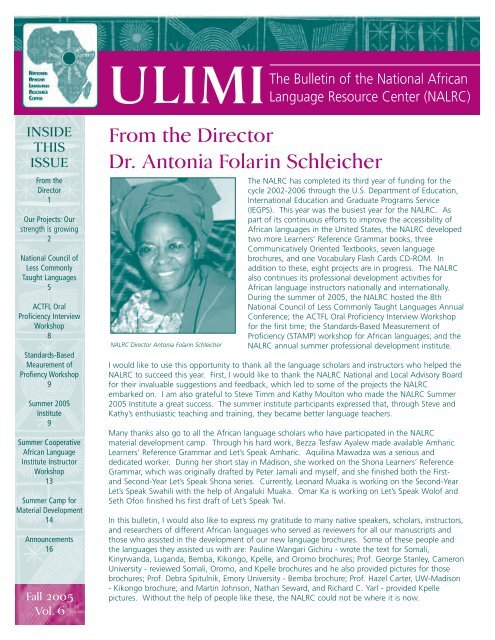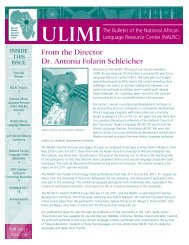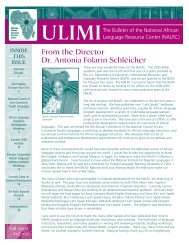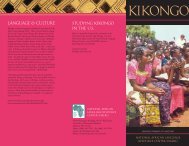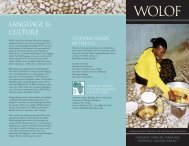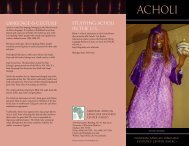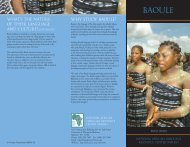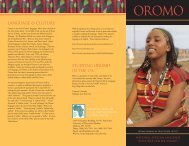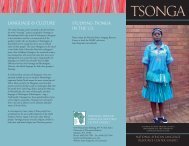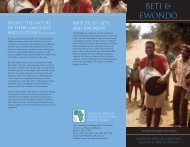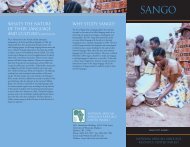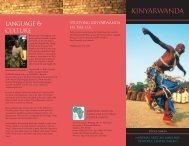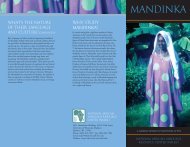ulimi 2005 - National African Language Resource Center - Indiana ...
ulimi 2005 - National African Language Resource Center - Indiana ...
ulimi 2005 - National African Language Resource Center - Indiana ...
You also want an ePaper? Increase the reach of your titles
YUMPU automatically turns print PDFs into web optimized ePapers that Google loves.
and Administration: A History and Guidelines forFuture Programs. This text is an outcome of the lifelongteaching and coordinating experience of one ofthe <strong>African</strong> language pedagogists, Prof. EyambaBokamba.iii. <strong>African</strong> <strong>Language</strong> Coordinators’ TrainingProgramsThe NALRC trains <strong>African</strong> language coordinatorsthrough various types of workshops. Theseworkshops aim to promote <strong>African</strong> languagecoordinators’ effectiveness in working with a widevariety of <strong>African</strong> language instructors. Usuallylanguage coordinators are requested to work withother <strong>African</strong> language instructors whose languagethey do not speak or understand. These workshopsteach the coordinators to work with their instructorsbetter and to mentor them more successfully. If youor your language coordinator needs such training,please contact the NALRC office.iv. <strong>African</strong> <strong>Language</strong> <strong>Resource</strong> ListThe NALRC maintains a list of <strong>African</strong> languageinstructors, native speakers, and scholars who areinterested in working as translators, interpreters, andtesters for government and non-governmentalagencies. This list is updated whenever the <strong>Center</strong>receives information from new resource people. Ifyou are interested in providing this kind of service,please call or email the NALRC office to be includedin the list.v. <strong>African</strong> <strong>Language</strong> Material and Workshop ListIn order to satisfy the <strong>Center</strong>’s mission to serve theentire community of <strong>African</strong> language educators withteaching resources, the NALRC has paid attention tomaterial needs in the field of teaching <strong>African</strong>languages. Since the initial needs assessment in1999, the <strong>Center</strong> has reviewed <strong>African</strong> languagematerial needs annually. Through the feedback fromvarious members of <strong>African</strong> language teachingcommunities, the NALRC maintains a list of materialneeds and workshop needs for <strong>African</strong> languageinstructors. The needs range from textbooks to audioand video tapes, web-based materials, and role-playcards. This list is critical when the NALRC decideswhich materials to develop and when we search foran able scholar or instructor who can possibly developthese materials. All the NALRC publications originatefrom these annual needs assessments. The NALRCurges scholars and instructors, who may be interestedin developing any of the materials, to contact theNALRC office. We also encourage them to inform usof any material and workshop needs that they feelthe NALRC should attend to.2. <strong>African</strong> <strong>Language</strong> MaterialDevelopment and DisseminationThe NALRC has placed priority over the project ofdeveloping and disseminating <strong>African</strong> languagematerials, since in the field of <strong>African</strong> languageteaching, the needs of teaching materials are morekeenly felt than in most LCTLs fields. Through thetremendous efforts of diverse scholars and <strong>African</strong>language teachers, the NALRC has contributed to thedevelopment and dissemination of language teachingmaterials ranging from commonly taught <strong>African</strong>languages such as Swahili to less-commonly taught<strong>African</strong> languages such as Amharic. This year, theNALRC published three Let’s Speak Series textbooks,three Learners’ Reference Grammar books, twojournals, and two multimedia CD-ROMs. In addition,the NALRC proudly announces seven new languagebrochures and as a result, the number of languagebrochures increases from 23 to 30. The following isthe list of all the <strong>African</strong> language materials that havebeen developed and published by the NALRC sincethe year 2000. The list also includes forthcomingpublications that are in progress.i. Textbooks published by the NALRCReference Grammars• Amharic Learners’ Reference Grammar (BezzaTesfaw Ayalew, Addis Ababa University, Ethiopia,<strong>2005</strong>)• Asante-Twi Learners’ Reference Grammar (DavidAdu-Amankwah, University of Florida, 2003)• Bamanankan Learners’ Reference Grammar(Amadou Tidiane Fofana, University of Wiscosnin-Madison & Mamery Traoré, University of Graz,Austria, 2003)• Pulaar Learners’ Reference Grammar (AntoniaSchleicher & Amadou Tidiane Fofana, University ofWisconsin-Madison, 2002)• Shona Learners’ Reference Grammar (Peter Jamali &Aquilina Mawadza, <strong>2005</strong>)• Swahili Learners’ Reference Grammar (Katrina DalyThompson & Antonia Schleicher, University ofWisconsin-Madison, 2001)• Zulu Learners’ Reference Grammar (Audrey N.Mbeje, University of Pennsylvania, <strong>2005</strong>)fall <strong>2005</strong> / 3
Let’s Speak Series• Let’s Speak Amharic (Bezza Tesfaw Ayalew, AddisAbaba University, <strong>2005</strong>)• Let’s Speak Egyptian Arabic: Dardasha (MustafaMughazy, Western Michigan University, 2004)• Let’s Speak Lingala: Tosolola Na Lingala (EyambaBokamba, University of Illinois, Urbana-Champaign,2004)• Let’s Speak Setswana (Sheila Mmusi, University ofthe North, South Africa. <strong>2005</strong>)• Let’s Speak Shona (Aquilina Mawadza, <strong>2005</strong>)• Let’s Speak Swahili: Tuseme Kiswahili (F.E.M.K.Senkoro, University of Dar es Salaam, Tanzania,2003)• Let’s Speak Zulu: Masikhulume Isizulu (ThandiwaNxumalo, Witwatersrand, South Africa & DumisileMkhize, University of Illinois, Urbana-Champaign,<strong>2005</strong>)ii. Texts in progressReference Grammars• Sesotho Learners’ Reference Grammar (SolomonChaphole, Vista University, South Africa)• Wolof Learners’ Reference Grammar (Omar Ka,University of Maryland-Baltimore County)• Yoruba Learners’ Reference Grammar (AntoniaSchleicher, University of Wisconsin-Madison)Let’s Speak Series• Let’s Speak Sesotho (Solomon Chaphole, VistaUniversity, South Africa)• Second-Year Let’s Speak Shona (Aquilina Mawadza)• Second-Year Let’s Speak Swahili (Leonard Muaka,University of Illinois, Urbana-Champaign & AngalukiMuaka, Stanford University)• Let’s Speak Twi (Seth Ofori, <strong>Indiana</strong> University)• Let’s Speak Wolof (Omar Ka, University ofMaryland-Baltimore County)iii. Multimedia Projects• First and Second Year Yoruba Online CourseVisit http://lang.nalrc.wisc.edu/level 1 andhttp://lang.nalrc.wisc.edu/level 2• Advanced level (3rd Year) Yoruba CD ROM• Vocabulary Flash Cards CD ROM in 15 <strong>African</strong><strong>Language</strong>s• Online bulletin board for <strong>African</strong> language learnersand teachers.Visit http://lang.nalrc.wisc.edu/board/ubbthreads/ubbthreads.php• Let’s Speak Swahili: Tuseme Kiswahili CD-ROM• Let’s Speak Amharic CD-ROM• Let’s Speak Egyptian Arabic: Dardasha CD-ROMOthers• <strong>African</strong> <strong>Language</strong>s in U.S. Colleges and Universities:Program Development and AdministrationGuidelines (2002)• Role Play Cards (2002)Journals• Journal of <strong>African</strong> <strong>Language</strong> Learning and Teaching(2001)• Journal of the <strong>African</strong> <strong>Language</strong> TeachersAssociation Volume 3 (2003)• Journal of the <strong>African</strong> <strong>Language</strong> TeachersAssociation Volume 6 (<strong>2005</strong>)• Journal of the <strong>National</strong> Council of Less CommonlyTaught <strong>Language</strong>s Volume 2 (<strong>2005</strong>)vi. Multimedia projects in progress• Je K’A Ko Yoruba CD-ROM• Let’s Speak Setswana: Bua Setswana CD-ROMULIMI / 4
Prof. Schleicher gives welcoming remarks at the NCOLCTL conference.<strong>Language</strong> <strong>Resource</strong> <strong>Center</strong> and brought togetherabout 200 participants from various countries such asSingapore, Hong Kong, United Kingdom anddifferent parts of the United States. This conferencewas sponsored by the UW-Madison InternationalStudies and Programs, UW-Madison College ofLetters and Science, <strong>African</strong> Studies Program,Anonymous Funds, <strong>Center</strong> for East Asian Studies,<strong>Center</strong> for European Studies, <strong>Center</strong> for InternationalBusiness Education and Research, <strong>Center</strong> for Russian,East Europe, and Central Asia, <strong>Center</strong> for South Asia,Department of <strong>African</strong> <strong>Language</strong>s and Literature,Department of Hebrew and Semitic Studies, GlobalStudies, <strong>Language</strong> Institute, Latin American,Caribbean and Iberian Studies, <strong>National</strong> <strong>African</strong><strong>Language</strong> <strong>Resource</strong> <strong>Center</strong>, and NCOLCTL.Egyptian Dance at the ReceptionHmong Dancers at the ReceptionThe conference hosted a pre-conference workshopfor the UW-Madison Less Commonly Taught<strong>Language</strong> community and conference participants.The conference also featured 4 plenary sessions, 50paper presentations, 4 colloquia sessions and 11poster presentations in addition to 9 exhibitionbooths. A computer with internet access wasprovided to the conference attendees at theexhibition room.The pre-conference workshop was conducted by Prof.Masakazu Watabe on “Establishing a Realistic andIndian Dance at the ReceptionMasakazu Watabe leads the pre-conference workshop.Middle Eastern Dance at the ReceptionULIMI / 6
Congressman Rush Holt givesa talk at the NCOLCTLconferenceRalph Hines leads a plenarysession at the NCOLCTLconference.Dora Johnson the Walton Award winner with Antonia Schleicher.Audrey Heining-Boytonaddresses LCTL scholars at theconference.David Edwards leads a sessionabout languages and thenational interests.Effective LCT <strong>Language</strong> Program for HigherEducation”. The workshop focused on how toestablish a language program in the U.S. highereducational institutions with results in mind.Discussion was centered on what kind of languageprogram we should envision and establish before webegin teaching the first year of non-Indo-Europeanlanguage class.The reception held on the same day featured colorfuldance performances staged by the Natyaprana DanceCompany. It was inaugurated with classicBharatanatyam dances led by Kripa Bhaskaran. Theywere followed by dances from Arabia, India, Hmong,the Middle East and Africa. Global unity wasemphasized by the last dance which featured allthese performers dancing to the tune of VandeMataram.The Welcome session on the 15th of April waschaired by Michael Everson. Speakers includedAssociate Dean Magdalena Hauner, Sally Magnan,Antonia Schleicher and Dean Gilles Bousquet. Thekeynote address was delivered by Congressman RushHolt of New Jersey. The need for foreign languageeducation in the U.S. was emphasized by theCongressman in his talk, titled “An UncommonMoment for Less Commonly Taught <strong>Language</strong>s”.Slater, Audrey Heining-Boynton, Ray Clifford andDavid Edwards. These sessions focused on topics likeTitle VI/Fulbright-Hays and Less Commonly Taught<strong>Language</strong>s, The Course of Human Events and<strong>Language</strong> Education in the U.S., The <strong>National</strong>Flagship <strong>Language</strong> Initiative (NFLI), American Councilfor the Teaching of Foreign <strong>Language</strong>s, GainingEsteem in the Academe, and <strong>Language</strong>s and the<strong>National</strong> Interests.Papers were presented in the fields of Research,Material, Curriculum, Teacher Development, Testingand Technology. The delegate assembly meeting washeld on the 15th of April and it was attended bydelegates from the constituent organizations ofNCOLCTL as well as the NCOLCTL executive boardmembers. The delegate assembly voted to acceptMGLTA (Modern Greek <strong>Language</strong> TeachersAssociation) as an affiliate member of the NCOLCTL.They also elected Erika Gilson as the at-largerepresentative for the executive board during themeeting.A dinner was held on the 16th of April to honor Dr.Dora Johnson with the <strong>2005</strong> Ronald. A. WaltonAward in recognition of a career of distinguishedservice to the LCTLs. This was followed by anacceptance speech by Dora Johnson in which sheshared with the audience, her invaluable experiencein the LCTL field stretching over four decades.The conference was a wonderful forum for theparticipants to share and communicate ideas on thecommon cause of promoting the Less CommonlyTaught <strong>Language</strong>s and identifying the various needsin this field.There were also four plenary sessions in theconference with eminent speakers from the LCTLfield such as Ralph Hines, Richard Brecht, Robertfall <strong>2005</strong> / 7
ACTFL Oral ProficiencyInterview Workshop for<strong>African</strong> <strong>Language</strong> InstructorsMay 23rd - 26th, <strong>2005</strong>OPI participants with their instructorsWith support from the American Council on theTeaching of Foreign <strong>Language</strong>s (ACTFL), the NALRCorganized an Oral Proficiency Interview (OPI)Workshop from May 23rd to 26th, <strong>2005</strong>. 18participants from different <strong>African</strong> languages such asSwahili, Zulu, Yoruba, Somali, Sudanese Arabic, andEgyptian Arabic, attended the workshop and theywere taught by two instructors, Virginia Maurer andRobert Vicars. The following is the list of participants:1. Charles Bwenge (University of Florida - Swahili)2. John Wa’Njogu (Yale University - Swahili)3. Alwiya Omar (<strong>Indiana</strong> University - Swahili)4. Magdalena Hauner (UW-Madison - Swahili)5. Tom Hinnebusch (University of California - Swahili)6. Leonard Muaka (University of Illinois - Swahili)7. Zoliswa Mali (University of Iowa - Zulu)8. Sandra Sanneh (Yale University - Zulu)9. Audrey Mbeje (University of Pennsylvania - Zulu)Ms. Maurer introduced various levels of proficiencyand assessment criteria to determine the proficiencylevels of interviewees. After the introduction, all theparticipants watched sample interviews and discussedtogether to figure out the interviewees’ proficiencylevels. Volunteers also had a chance to practiceinterviewing based on the training they had got fromMs. Maurer. After each interview, the participantsdiscussed the proficiency level of the interviewee andthey also talked out the interview strategies andquestions. On the second day, Mr. Vicars led aworkshop about interview structure and strategies.He explained to the participants how to interviewsuccessfully and how to elicit talk from the interview.After the plenary session, the participants weredivided into language specific groups and they hadmore opportunities to conduct interviews themselves.On the third day, the participants learned how tointerview advanced and superior-level languagelearners since those learners require different skillsfrom novice and intermediate-level learners. On thelast day, the participants had another plenary sessionabout implications of the OPI for classroominstruction and assessment.All the participants said that this workshop exceededtheir expectations. They thought this workshop meetthe goals of the ACTFL OPI tester Training workshop,which were to teach the principles and procedures oforal proficiency testing and to provide ampleopportunity for participants to practice interviewingand rating techniques. The activity the participantsthought to be most useful was to practiceinterviewing learners of various levels. They alsostated that they learned a lot by watching othersconduct an interview as well. As for futurepedagogical implications, the participants answeredthat they received very helpful insights and ideas forteaching a language and that this workshop woulddefinitely make a change in their teaching as well asin their curriculum development.10. Akinsola Ogundeji (UW-Madison - Yoruba)11. Akintunde Akinyemi (University of Florida -Yoruba)12. Akinloye Ojo (University of Georgia - Yoruba)13. Antonia Schleicher (UW-Madison - Yoruba)14. Mustafa Mughazy (Western Michigan University -Egyptian Arabic)15. Gebril Atta (University of Iowa - Egyptian Arabic)16. Abdinoor Abdullahi (Ohio University - Somali)17. Alhadil Esameddin (Ohio University - SudaneseArabic)18. Salama Mohammad (UW-Whitewater - Arabic)On the first day, the participants had a plenarysession about what the oral proficiency interview is.OPI participants have a discussion.ULIMI / 8
Summer <strong>2005</strong> Institute fellows with their instructors.Steve Timm gives a lecture to the institute fellows.Summer <strong>2005</strong> institutes lasted from May 31st to June13th, <strong>2005</strong>. In total, 9 fellows attended the institutesand they came from institutions of higher learningacross the United States—University of Oregon,University of Illinois at Urbana-Champaign,Pennsylvania State University, Ohio University, <strong>Indiana</strong>University at Bloomington, and UW-Madison.Akinsola Ogundeji gives a Yoruba lesson to his colleagues.Antonia Schleicher welcomes the Summer Institutes participants onthe first day.ULIMI / 10Upon the request of LCTL programs and also uponthe feedback of the previous institute participants,this year’s summer institutes addressed four majorthemes: teaching speaking, listening, reading andwriting skills in the <strong>African</strong> language classroom,testing and assessing the four skills in the <strong>African</strong>language classroom, lesson planning and classroommanagement.The first part of the Institutes was led by Steve Timm,who has been leading the NALRC Summer Institutesfor two years with the other instructor, KathyMoulton. Steve Timm led the first week of theworkshop, focusing on the teaching aspects ofspeaking and listening. Although the fellows had agreat deal of information to absorb, Steve’shumorous and friendly demeanor made theworkshop fun, as well as challenging.During the second week of the workshop, KathyMoulton taught reading and writing skills. KathyKathy Moulton leads a workshop in the second week.demonstrated how to keep students’ interest levelup, having the fellows participate in language gamesand contests. These contests showed the summerinstitute class of <strong>2005</strong> to be the most competitiveclass yet, even turning to a videotape of “instantreplay” to figure out who won a certain game!On the last day of the institute, a closing ceremonywas held in the Solitaire room at the MadisonConcourse Hotel. Antonia Schleicher delivered aclosing speech, congratulating all the fellows on thesuccessful completion of the institutes and stressingthe importance of the future generation of <strong>African</strong>language teachers. Certificates were presented tothe following 9 fellows:
1. Akinsola OgundejiUniversity of Wisconsin-Madison2. Awa SarrUniversity of Illinois at Urbana-Champaign3. Bavwidinsi BawawanaUniversity of Illinois at Urbana-Champaign4. Esther LisanzaUniversity of Illinois at Urbana-Champaign5. Yasin OzturkUniversity of Illinois at Urbana-Champaign6. George LugalambiPennsylvania State University, State College7. Basetsana MaposaOhio University, Athens8. Mamarame Seck<strong>Indiana</strong> University, Bloomington9. Marko MwipopoUniversity of Oregon, EugeneReflections were given by Esther Lisanza, MarkoMwipopo, and speeches were given by Steve Timmand Kathy Moulton, and Mamarame Seck.At the Award CeremonyEsther Lisanza gives a speech at the award ceremony.Esther Lisanza, University of Illinoisat Urbana-ChampaignHamjambo? mbote, sango nini? Wasuze otya?Merhaba! Salama Alaikum! Dumela ng? Ekaroo,Good evening!It is my honor tonight to stand before you and lookback at what has happened in the last two weeksduring our training. First and foremost, I would liketo thank the NALRC for giving us the opportunity toattend the summer institute training. I would like tothank every staff involved in making our trainingpossible. In particular, I would like to thank Prof.Schleicher for giving us the opportunity to be here. Iremember the first time I met her at Illinois. Shetalked about the summer institute training and howeffective the training is. This was the first time I hadheard about this training. Thank you Professor formaking me aware of the summer institute training. Ialso thank my colleagues for giving me theopportunity to be both a teacher and a student! Youwere my great friends in the past two weeks. Thankyou guys, I will miss you!Well, I have been trained as a Swahili teacher back inKenya but I wasn’t trained to teach Swahili as aforeign language. Therefore this training was veryimportant to me and to us all who have attended thissummer’s training. I have taught Swahili as a secondlanguage at the University of Illinois for the last oneyear and as an instructor I have sometimes feltincapacitated in class though with my prior training.This is why the training I have received here comes inthe right time to help me overcome my problems. Ican confidently say I will be a better teacher than Iwas before.Basetsana Maposa receives her certificateAs I came for the training, like many of the SummerInstitute participants I was very sure it is impossible toteach Swahili without major use of English. However,through the Summer Institute training we haverealized it is quite possible to teach any language byuse of the target language with minimal use ofEnglish or other language. Summer Institute traininghas also given us the confidence to teach in ourfall <strong>2005</strong> /11
classes. This is because we have been taught how tohandle different classrooms scenarios.For the last two weeks we have had wonderfulinstructors: Kathy and Steve. I have admired theirstyle of teaching as many of my colleagues have said.I like the way they have been correcting our mistakesin class during our teaching. All through Kathy andSteve have been positive even when we committedmistakes. It was a great lesson to us, to alwaysappreciate our students’ efforts. I have admiredKath’s energy and she has always given me a reasonto be active in class too. Instructor Steve is charmingas one of us has said and I believe we all agree.Thank you baba Steve and Mama Kathy.Thank you all. Asanteni sana.Marko Mwipopo shares his reflections at the award ceremony.Marko J. Mwipopo, University of OregonFirst of all, I would like to thank God who made myattendance at the Summer Institute possible.Secondly, I thank the director of <strong>African</strong> Studies,University of Oregon, Dr. Steven Wooten and thedirector of the Self Study <strong>Language</strong> Program, Yamada<strong>Language</strong> <strong>Center</strong>, University of Oregon, Jeff Magotowho made prior arrangements for me. Equally, if notmore important, I would like to also thank thedirector of the NALRC in Madison, Professor AntoniaSchleicher, Assistant Adedoyin Adenuga and ProjectCoordinator Sookyung Park Cho who made allarrangements for me before and during the training.I thank the individuals mentioned for their devotedservice to their institutions on one hand and to me asa human person to the other. It is not easy tomention everything, each of them contributed tomake the program a success. Their devotion rangedfrom the time they spend to material support. Istayed in a comfortable hotel because of them, I atebecause of them, I feel I am a better language tutorbecause of them, I now have a longer list of friendsbecause of them, I saw the wonderful beauty ofMadison because of them (lakes Monona andMendota, the capitol, and a large university campus)and too much more to mention.The attendance to the training has totally changedme into a skilled language teacher. This makes meproud of the instructors, too. These are Kathy andSteve. Their experience in teaching has a blend ofmany things ranging from methodology tointeraction with the learners/<strong>African</strong> <strong>Language</strong> tutors.Everyone left Madison happy on one hand because ofthem and sad on the other hand because we didn’twant to leave them! I haven’t forgotten Andrew -thetechnician, for his wonderful job during the training.I realized that the Institute is playing a very significantrole to the expansion and successful teaching in<strong>African</strong> languages. One of the reasons is thatsometimes <strong>African</strong> language tutors have a generalknowledge about teaching but they lack specificskills, necessary for a particular setting and audience,in this case the American learners. I did my firstbachelor’s degree in arts with education, but I wasnot taught how to be a better teacher in <strong>African</strong>language. Also, the other reason for importance ofthis institute is that some instructors have neverattended any teacher training before. So, withoutthe NALRC, they would continue teaching withouteven being able to reason why they do that way orthey shouldn’t do the way they are doing.I would think that it is high time for the governmentand any interested stakeholders to make efforts inpromoting <strong>African</strong> languages in many universities andcolleges in the country. For instance, I would behappy to find that University of Oregon has more<strong>African</strong> languages being taught. For now, there isonly Swahili language. I hope the Institute inMadison will stretch its eye and help to establishmore languages at my institution.Finally, I would like to congratulate the Institutedirector once again, for finding excellent instructors -Kathy and Steve. You will regret if you don’t retainthem for another year’s instruction. Long live NALRC,the staff, and thanks to the US government.Steve Timm and Kathy Moulton, University ofWisconsin, MadisonFirst of all, we two would like to thank the NALRC,Prof. Schleicher, Doyin, Sookyung and Andrew, whowas a wonderful DJ and postman and who wasmaking it possible for us to join once again and bepart of this wonderful institute. It is really a privilegefor us to be here. Quite frankly this is the highlightof the year for us. It was the last year, which was thefirst year Steve and I did it. When I say it is thehighlight of this year, three months ago we weretalking, “Here we can. It is coming again. It is goingto be so wonderful.” It was just a fantasticexperience for us and wonderful opportunity for usto meet you and learn more about your languagesand your countries. It has just been fantastic.ULIMI / 12
I also want to say, since you talked aboutexpectations coming into this kind. Having done itlast year, it was so exciting and so different frommany things I have done. In the two weeks, I was soexcited and also dumber soon because there was alot of energy. I just want to boil up like a volcano.And I felt “Okay, I have done it once. So this year,you know, I am used to it.” But I was surprisedcomplete. This year was even more wonderful thanlast year. And I can definitely say, I think, an averageof teaching of nine of you is even better than that oflast year. I really think so. You’re very dynamic. Wewere looking through our notes today and realizinghow much language we learned from each every oneof you and in such a good way. So much fun and somuch charm.outstanding teaching experience, knowledge, andtips. We are all proud of ourselves today. I feel verywell prepared and confident to teach our nativelanguages in a very communicative approach. Withthe voice of different people speaking differentlanguages, I would like to thank you very much.Mamarame Seck gives a vote of thanks at the award ceremony.Steve Timm and Kathy Moulton give a speech at the awardceremony.I also want to thank Prof. Schleicher very much forgiving us this wonderful opportunity. This was veryspecial to us. Thanks for Doyin for his serve behindthe scene, quiet and persistent hard work. And eventhough I have never got any money from Sookyungand for Andrew, what can I say? You’re fabulous.He even helped Akin demonstrate Yoruba dialogues.After these reflections, Kathy and Steve demonstrateda multi-language dialogue to prove that both of themlearned so much language from the participants. Thedialogue was composed of all the languages theSummer Institute participants represent. All theparticipants really appreciated Steve and Kathy’sconcern and efforts to teach and even entertainthem.Mamarame Seck, <strong>Indiana</strong> University, BloomingtonI will say that in the name of all my colleagues here. Iwould like to say a few words of honor for all mycolleagues. Especially to the Director of <strong>National</strong><strong>African</strong> <strong>Language</strong> <strong>Resource</strong> <strong>Center</strong>, Dr. Schleicher andto all her staff, Andrew and Doyin for their hard workto make this program unbelievably successful. I alsowould like to say a few words of honor to thetremendous teachers, Kathy and Steve for the greatopportunity they have given us to benefit from theirSummerCooperative <strong>African</strong><strong>Language</strong> Institute(SCALI) InstructorWorkshopJune 16th - 17th, <strong>2005</strong>Antonia Schleicher gave a two-day workshop toSummer Cooperative <strong>African</strong> <strong>Language</strong> Institute(SCALI) instructors from June 16th to 17th. Theworkshop was about “<strong>African</strong> <strong>Language</strong> Instructionthat Brings Desired Outcomes: With a Focus onIntensive <strong>Language</strong> Teaching.” In total, 16 instructorsof various <strong>African</strong> languages participated in theworkshop. Six of them had already been trainedthrough the NALRC Summer Institutes.Antonia Schleicher started the workshop with generallanguage learning issues: what you have to do toprepare for a course; what an ideal syllabus contains;how you set your expectations for your class; andhow you reconcile student goals with your goals inclass. After discussing the general language learningissues, Antonia Schleicher brought up the topic ofassessing four different skills: speaking, listening,reading, and writing. She emphasized closerelationship between teaching, testing andassessment. She also explained what evidence weneed in order to assess the desired knowledge andfall <strong>2005</strong> /13
skill. On the second day, Antonia Schleichercontinued the workshop by teaching the participantshow to teach the four language skills. The instructorswere given the opportunity to demonstrate microteaching activities to one another based on what theyhad learned from the workshop, and discussionsfollowed after each demonstration.For those who had already participated in the NALRCSummer Institutes, this workshop was a good chanceto refresh their memory. On the other hand, forthose who had never participated in the NALRCSummer Institutes, this workshop was a very goodopportunity to learn essential skills in teaching<strong>African</strong> languages.Antonia Schleicher with the workshop participantsAntonia Schleicher leads the SCALI workshop.Zoliswa demonstrates teaching activities.NALRC MaterialDevelopmentSummer CampThe NALRC has been hosting a material developmentsummer camp every year in order to make materialsavailable for the teaching and learning of different<strong>African</strong> languages. The camp was first started in2002, as an effort to narrow the gap between<strong>African</strong> languages and other commonly taughtlanguages such as Spanish, French, and German interms of the availability of teaching and learningresources. Since then, the Summer camp hasproduced four textbooks based on thecommunicative approach: Tuseme Kiswahili, TosololaNa Lingala, Let’s Speak Amharic, and Let’s SpeakZulu. This year’s summer camp brought severalscholars together again and made possible somemanuscripts in progress.1. AquilinaMawadzaAquilina Mawadza camefrom Zimbabwe and workedon a first-year and a secondyearShona textbooks. As atrained linguist and Shonainstructor, Aquilina hadwritten several books about Shona languagegrammar and teaching. She also teaches Shona as aforeign language. Since 1994, Mawadza has beenteaching Shona to students of various levels such asuniversity students and high school students both inZimbabwe and in the United States. We were reallylucky to have her come from South Africa, where sheis currently based to attend the summer materialdevelopment camp, which has now led to thedevelopment of both elementary and intermediatelevel textbooks for Shona.2. Seth OforiSeth Ofori came from Ghanaand he is currently a doctoralcandidate at <strong>Indiana</strong>University-Bloomington. Heattended the summermaterial development campto work on the Twitextbook, which is one ofthe NALRC let’s speak <strong>African</strong> language series. Since1997, Mr. Ofori has been teaching the Akan/Twilanguage to various students and he has beenconducting a lot of research on the Akin/Twilanguage.ULIMI / 14
3.Leonard Muaka & Angaluki MuakaLeonard Muaka originally came from Kenya and he isa doctoral candidate at the University of Illinois atUrbana-Champaign. During the summer materialdevelopment camp, he participated in the project ofdeveloping a second-year Swahili textbook withAngaluki Muaka. Angaluki Muaka is currentlyteaching Swahili at Stanford University. Both of themhad taught Swahili in Kenya, and since they came tothe United States, they have put their efforts onteaching Swahili to English-speaking students. AsSwahili instructors, they have a better understandingof students’ needs in learning Swahili especially at theintermediate level.4. Omar KaOmar Ka originally camefrom Senegal and he iscurrently a professor in thedepartment of Modernlanguages and linguistics atthe University of MarylandBaltimore County Campus.During the Summer Camp,he worked on a first-yearWolof textbook. He hasconducted a wide variety ofstudies on language planning and education in WestAfrica as well as on Wolof phonology andmorphology. Let’s Speak Wolof is based on hisexperience as a Wolof language teacher and scholar.5. Alwiya OmarAlwiya Omar visitedMadison again to finish theK-12 project, which is todevelop Swahili learningmaterials for Pre-K to 5thgrade students. She is thenew president of the <strong>African</strong><strong>Language</strong> TeachersAssociation (ALTA) and is currently a professor ofSwahili at <strong>Indiana</strong> University in Bloomington.6. AntoniaSchleicherAntonia Schleicher alsoparticipated in the K-12project. She is currentlyworking on Yoruba learningmaterials for Pre-K to 5thgraders. She is alsodeveloping severalmultimedia learning materials for Yoruba. Prof.Schleicher is the director of the NALRC and theexecutive director of the <strong>National</strong> Council of LessCommonly Taught <strong>Language</strong>s. She is also a professorof <strong>African</strong> <strong>Language</strong>s and Literature at the Universityof Wisconsin-Madison.Position Vacancy:<strong>African</strong> <strong>Language</strong>sand LiteratureThe Department of <strong>African</strong> <strong>Language</strong>s andLiterature of the University of Wisconsin-Madison invites applications for a tenure-trackposition at the assistant professor level. Weseek a scholar whose work focuses on <strong>African</strong>languages, literature, or linguistics, and whohas a high level of competency in an <strong>African</strong>language. Preference will be given tocandidates with a strong record in teaching.Applicants must have completed the Ph.D. bybeginning of appointment in August 2006 andshow promise of a distinguished career as ascholar and teacher. For consideration, yourletter of application and c.v., three letters ofrecommendation, and a writing sample(strongly preferred length: under 50 pages oftext) should arrive by Tuesday, November 1,<strong>2005</strong>. The writing sample may be a selfstandingessay, or a chapter from a dissertationor book project. Chapters should beaccompanied by a brief outline or statement(less than 2 pages) that sets the chapter in thecontext of the larger work and its argument.Send materials to the following address: Prof.Linda Hunter, Chair of the Search Committee,Department of <strong>African</strong> <strong>Language</strong>s andLiterature,1414 Van Hise Hall, 1220 LindenDrive, Madison, Wisconsin 53706(lhunter@wisc.edu). The UW-Madison is anAA/EOE and encourages applications fromwomen and minorities. Unless confidentiality isrequested in writing, information regardingapplicants must be released upon request.Finalists cannot be guaranteed confidentiality.fall <strong>2005</strong> /15
ANNOUNCEMENTS1. Translations/InterpretationsThe NALRC has been providing quality services in thearea of translation and interpretation of various<strong>African</strong> languages. If you need these services, pleasecontact us. We have a resource list of translators andinterpreters. The list is not restricted to <strong>African</strong>languages, and it is also open to anyone who speaksa less commonly taught language. If you want to beincluded in the list, please let us know.2. Job Opportunities AdvertisementsMany scholars, instructors, and students in the fieldof less commonly taught languages visit the NALRCwebsite. Please inform us of any <strong>African</strong> languagerelated vacancies that you want to fill in yourprograms. We will be willing to advertise them at nocost.3. Upcoming ConferencesWe urge our readers to take note of the followingdates for upcoming conferences so that you can planahead and attend these very important conferencesin the upcoming academic year <strong>2005</strong>-2006.i. <strong>African</strong> Studies Association (ASA)Date: November 17-20, <strong>2005</strong>Venue: Washington D.C.Theme: Health, Knowledge, and the Body/Politic inAfrica and the <strong>African</strong> Diasporaii. American Council on the Teaching of Foreign<strong>Language</strong>s (ACTFL)Date: November 18-20, <strong>2005</strong>Venue: Baltimore, MarylandTheme: <strong>2005</strong>-2015: Realizing Our Vision of<strong>Language</strong>s for Alliii. <strong>African</strong> <strong>Language</strong> Teachers Association (ALTA)Date: March 23-25, 2006Venue: Rutgers UniversityTheme: <strong>African</strong> <strong>Language</strong>s in the Age ofGlobalization: Prospects and Challengesiv. Northeast Conference on the Teaching ofForeign <strong>Language</strong>sDate: March 30 - April 2, 2006Venue: New York Marriott MarquisTheme: Building on Common Ground: Within,Across, Beyondv. Association of <strong>African</strong> Studies Program (AASP)Date: April 6-8, 2006Venue: Washington D.C.vi. <strong>National</strong> Council of Less Commonly Taught<strong>Language</strong>s (NCOLCTL)Date: April 28-30, 2006Venue: Madison, WisconsinTheme: Expanding the LCTL Capacities in the UnitedStatesFor any questions about dates and locations of conferences,please contact:<strong>National</strong> <strong>African</strong> <strong>Language</strong> <strong>Resource</strong> <strong>Center</strong> (NALRC)4231 Humanities Building455 North Park StreetMadison, WI 53706Tel: 608-265-7905Fax: 608-265-7904ULIMI / 16


